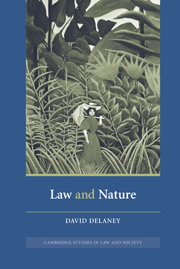Book contents
- Frontmatter
- Contents
- Acknowledgments
- Part I Situating nature
- 1 Introduction: the pragmatics of nature and the situation of law
- 2 The nature of modern political discourse: doing things with nature
- 3 The natures of scientific discourse
- 4 The natures of legal discourse
- 5 The natures of legal practice
- Part II Rendering nature
- Part III Judging nature
- References
- Index
5 - The natures of legal practice
Published online by Cambridge University Press: 22 July 2009
- Frontmatter
- Contents
- Acknowledgments
- Part I Situating nature
- 1 Introduction: the pragmatics of nature and the situation of law
- 2 The nature of modern political discourse: doing things with nature
- 3 The natures of scientific discourse
- 4 The natures of legal discourse
- 5 The natures of legal practice
- Part II Rendering nature
- Part III Judging nature
- References
- Index
Summary
INTRODUCTION
Imagine that you are the judge. You speak the word of law. You are the bringer of justice or order. You are dealing with troubles of one sort or another. These troubles may come to you from anywhere. They began their journey in the “extralegal” world and were transformed into prosecutions or civil suits. The troubles that you are to deal with – to resolve, in some sense – come to you already translated into terms that you, the speaker of law, can competently handle. The pleadings, motions, briefs, or oral presentations cast the troubles in the idiom of legal discourse. They may involve virtually any topic. They may be relatively simple or extremely complex. You may find your tasks relatively easy or profoundly difficult, difficult intellectually and even emotionally. The civics class version of your task is that you are to “apply the law to the facts,” but you know that there is much more to it than that. Though you will be guided by at least two different, contending interpretations of the law, of the facts, and of how to best apply the former to the latter, the task is yours. You have a lot of work ahead of you. If you are a trial judge you have to conduct the trial. If there is a jury you have to guide and instruct its members. If you are an appellate judge you may have to produce a public document that purports to lay out your reasoning.
- Type
- Chapter
- Information
- Law and Nature , pp. 103 - 138Publisher: Cambridge University PressPrint publication year: 2003

